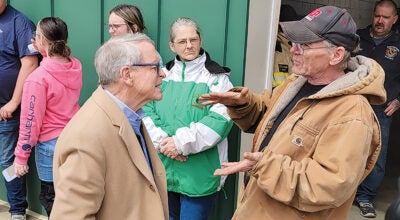Fighting ALS
Published 12:13 am Sunday, May 10, 2015
Judge speaks out about disease to raise awareness
In the courtroom of Common Pleas Judge D. Scott Bowling, a new motto hangs above the bench — “In God We Trust.”
That is the official motto of the United States, but it’s also a personal motto for Bowling, who said it is with God he places his trust. Not just in the way a faithful Christian follower would do, but in a way that someone whose once clear life vision became blurred with uncertainty would place their trust, knowing the ultimate outcome is not what he once pictured.
“I hope I’m a better person in God’s eyes based on my great reliance in his strength versus my own,” Bowling said while sitting in his chambers. “I wouldn’t change a thing.”
Bowling, 49, learned of his ALS — commonly known as Lou Gehrig’s Disease — in September of 2012. After about a year of experiencing weakness in his right arm — thought to be from an old football injury — all other possibilities for the weakness were ruled out, leaving only the progressive neurodegenerative disease to blame.
This is the first time Bowling has spoken to The Tribune about his diagnosis and he did so in hopes of opening others’ eyes about the disease.
“The reason for my cooperation is to bring awareness to this vicious disease,” Bowling said. “I don’t want anyone feeling sorry for me. I’ve been blessed with a great life, a great family, lots and lots of friends. I wouldn’t change a thing.”
What is ALS?
According to the ALS Association, amyotrophic lateral sclerosis is a progressive neurodegenerative disease that attacks nerve cells and pathways in the brain and spinal cord. When these cells die, voluntary muscle control and movement dies with them. Patients in the later stages of the disease are totally paralyzed, yet in most cases, their minds remain sharp and alert.
Onset of the disease is typically gradual, starting in the muscles that control speech and swallowing or in the hands, arms, legs or feet. Not all people with ALS experience the same symptoms or the same sequences or patterns of progression.
In Bowling’s case, he said he felt weakness in his right arm. About two and a half years later, he has lost the use of both of his arms and experiences difficulty holding his head up and speech becomes difficult after prolonged talking.
First appointed as common pleas judge in 2007, the disease has started to affect Bowling’s proceedings, as well as his day-to-day activities.
“You make adjustments in your life continually, understanding it’s a temporary fix that will have to be modified again as the limitations continue,” he said.
With speech difficult at times, Bowling uses some prerecorded videos during court, which address either the attorneys or defendants with common colloquialisms that are required by the state.
Without the use of his arms, Bowling has more help from his staff in the courtroom.
He was also recently approved the use of a signature stamp by the Ohio Attorney General.
In his office, he controls his computer with voice recognition software and his mouse with his foot.
At home, his wife of 25 years, Donna, takes care of the rest, as well as a host of family and friends who have lent their support in various ways.
Prognosis
Close to 6,000 people are diagnosed with the disease each year, but little is still known about what actually causes ALS. It can affect anyone, regardless of race, gender or geographical location.
ALS became well known in the United States after New York Yankees first baseman Lou Gehrig was diagnosed in 1939. He died two years later.
Before his diagnosis, Bowling said the only thing he knew about ALS was from Gehrig’s famous speech at Yankee Stadium, in which the baseball player said he considered himself “the luckiest man on the face of the earth.”
“I assumed that it would surely be treatable or curable by now,” Bowling said.
There is currently no cure for ALS. There is only one drug approved by the FDA to treat ALS, which Bowling said he has taken for about two years.
“It is supposed to slow the progression of the disease by a matter of months,” he said.
Life expectancy is about two to six years after diagnosis, but up to 10 percent of people with ALS will live more than 10 years. Five percent will live 20 years.
Stephen Hawking, British theoretical physicist and author, has lived with the disease for more than 50 years. He requires a ventilator to breathe and uses a computer program to communicate speech.
Awareness
This past summer, thousands of people soaked themselves doing the Ice Bucket Challenge to raise awareness for ALS. It was the largest fundraising effort the ALS Association has seen, bringing in more than $220 million for the fight against the disease.
Locally, many Lawrence County residents got into the act, including elected officials and teachers.
“Everybody I knew did that,” Bowling said. “The ALS Ice Bucket Challenge brought a lot of awareness and a tremendous amount of funding for additional research that the disease has never seen before.”
May is ALS Awareness Month and cities all over the country are hosting walks, runs, bike rides and other events to raise money for research of the disease.
‘Expectations’
Bowling is a 1984 graduate of Symmes Valley High School. He earned an associate degree from Rio Grande and a bachelor’s degree in business from Ohio University in 1988. He was a medical technologist at Lawrence County General before going on to earned his law degree from Capital University in 1997.
He practiced law for 10 years before his appointment as common pleas judge in 2007. Bowling said he assumed he wanted to be a judge one day, but when Judge Richard Walton retired after three decades on the bench, he figured he had better jump at the opportunity.
“I’ve always been a very ambitious person, but the day they told me had ALS, I’ll never forget how little value I placed on the things I worked for my entire life,” Bowling said.
He said his diagnosis came as a shock.
“I guess I had … expectations,” Bowling said, fighting back emotion. “When you think about the effect it has on your family, that’s difficult.”
Bowling and his wife have two sons, Brandon, 23, and Jordan, 21.
Despite his diagnosis, Bowling said he tries not to dwell on the future and relies on God’s strength to get through each day.
“His word teaches us we are not to worry about tomorrow, because there is sufficient evil to worry about today,” he said.
Bowling continues to be active in his church, Oakland Chapel Church, and its associated non-profit, Jeremiah 38 Ministries. He has plans to travel with the ministry for medical mission trips in Peru and Honduras, as well as a Bible study trip to Israel.
Above all, Bowling said by speaking out he wanted to call attention to ALS.
“It’s not about me; I do want to bring some awareness to ALS and also hopefully have a good testimony for my savior. That’s what it’s about for me. And to finish strong.”





